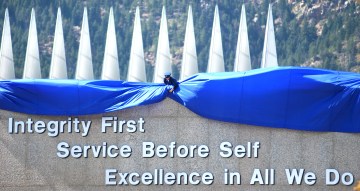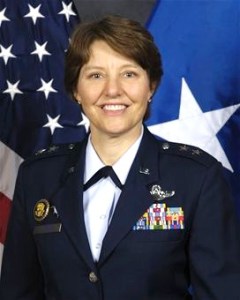The Air Force Academy, and its chapel, overlooking northern Colorado Springs, Colo.
Following the sexual assaults at the 1991 Tailhook convention in Las Vegas, the Navy opened up combat-aircraft cockpits and warship berths to women. After the sex scandal at Maryland’s Aberdeen Proving Ground in 1996, the Army opened up more jobs for women, clearing the way for the first female soldier to earn a Silver Star for direct combat in Iraq.
So it should come as no surprise that the Air Force – following a basic-training sex scandal at Lackland Air Force Base in Texas – has just announced that it has tapped a woman to run the Air Force Academy at Colorado Springs.
There’s no link between the two. Mentioning them together is surely not intended to take anything away from the historic naming of Major General Michelle Johnson to be the first woman to serve as academy superintendent. But it is interesting to trace the challenges and successes that such outliers face when trying to climb to their tops of their chosen field.

In 2003, the Air Force Academy took down its “Bring Me Men” slogan – “after Air Force leaders decided the words were out of step with the current culture, as well as offensive to many people,” the service said at the time – and replaced it the following year with the Air Force’s “core values.”
There is inertia, and there is momentum. The two forces clash all the time on the military’s personnel side.
If you pay attention, you wince when underlings belonging to one long-excluded group or another are sidelined and/or oppressed. But in a culture as wrapped up in tradition as the U.S. military, it almost seems as if such wrongdoing is part of a shot-peening process designed to strengthen the outsider before he or she can move inside.
When the inevitable happens – and a woman, a racial minority or an openly gay person – is picked for some high-profile assignment, traditionalists are gob-smacked:
“They picked who for that job?”
The next step is key: generally, the pioneer comes in and performs adequately, if not stellarly – just like the generations of white males that had come before.
When the predicted disaster doesn’t happen, most in the military shrug their shoulders and move on.
All of which makes it easier for the next pioneer. Until, after several such examples, they cease being pioneers…and become mere people.
“It does not appear that General Johnson was chosen because she was a woman, but because she was the best choice for the job — that’s a good thing,” says Darlene Iskra, who in 1990 became the first woman to command a Navy vessel, the salvage ship USS Opportune. “One person can make a difference, especially if she is the one in charge.”
Robert Scales is a retired Army major general and military historian who served as commandant at the Army War College. He’s also the father of two daughters who followed their father into the Army. He says Johnson’s appointment says that “women do well without having to engage in direct combat,” that the academy and places like it are “excellent billets for senior female officers” and that it “sends a message to other female officers that it’s OK to push ahead in their careers in spite of the headwinds that all of them (to include my girls) experience.”
He also believes that women have it tougher than racial minorities or gays in uniform. “I still believe that the least well-acculturated segment in the military is still women,” Scales says. “Why? I don’t know. It’s certainly not because the Army in particular hasn’t tried. All of this when women have proven their abilities in combat. But today among the ranks there is still resentment of women among them that defies simple explanations. Is it sexual tension? Does this tension increase during times of in extremis situations? So far the data is inconclusive. A gulf between physical standards?” he wondered. “I asked my girls what the most important part of leadership was and they told me: `Don’t fall out of a run.’”
Scales’ bottom line: “The role of women has become so political charged that all sides are too emotional.”
Johnson currently serves as NATO’s deputy chief of staff for operations and intelligence (What: a woman in that vital slot?). A 1981 graduate of the academy (What: women at the academy?), she became the school’s first female cadet wing commander and first female Rhodes scholar. Johnson played varsity basketball (What: they have a women’s varsity basketball team at the Air Force Academy?) all four years, and is the women’s team’s second-highest all-time scorer with 1,706 points.
She was named the academy’s most outstanding scholar-athlete in 1991 (What: smarter than all the guys?). Johnson is a command pilot with more than 3,600 flight hours in large cargo planes and aerial refueling tankers (What? A woman in command of those lumbering giants?)
It all begins to sound like a broken record after awhile.
So congratulations to Johnson, who will be promoted to three-star – lieutenant general – rank upon taking her new post. Even though she’s in the Air Force, it’s right to think of her as an icebreaker.
Or, more in keeping with her blue suit, perhaps a SEAD – suppression of enemy air defenses – aircraft. Those are the radar and missile-killing warplanes that are among the first to fly into hostile airspace, charged with wiping out all the flak, and clearing the way for others to follow.



